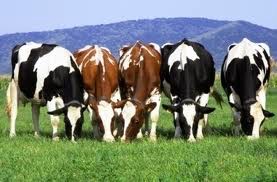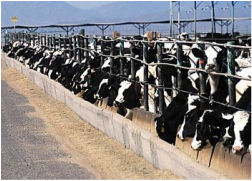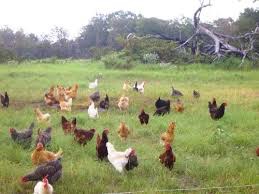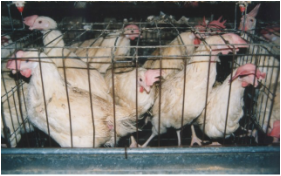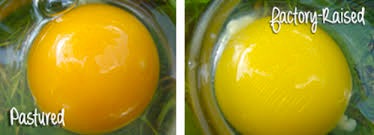|
One of my previous posts talked about the importance of organic produce - mainly fruits and vegetables. There is also value in buying organic , pasture-raised animal products. The quality of animal protein is dependent on the health of the animal; and the health of the animal depends on the life it had, what it ate, and where it lived. The meat, milk, and eggs in our supermarkets are highly contaminated and vastly inferior in nutritional quality to those available to our ancestors just a few decades ago. Healthier animals provide healthier food for humans. Organic means that a food is free of fertilizers, pesticides, growth hormones, and antibiotics. Let’s take a look at the differences between pasture-raised and pen- raised animals.
Milk
Nutritional Benefits: Grass -fed vs. Grain-fed beef
Butter Fat-soluble vitamins (A, D, E, K) occur in large amounts only when butter comes from cows eating green grass. Butter from pasture-raised cows contains CLA, which has strong anti-cancer properties. It also encourages build-up of muscle and prevents weight gain. CLA disappears when cows are fed even small amounts of grain or processed foods.
Note the vibrant color of the egg yolk from pasture-raised chickens. Make an effort to obtain organic beef, lamb, and chicken. Other good meat choices include buffalo, wild game (deer) and game birds like duck, geese, pheasant, and wild turkey. To help you find small, local farms in your area (searchable by zip code), try: www.localharvest.org or www.eatwild.com. In addition, seafood is a great source of animal protein. It tends to be very digestible and contains a great variety of trace minerals. Choose wild fish over farm-raised, which are often fed soy food instead of the healthier insects, larvae, and smaller fish that is part of a wild fish’s diet. Farmed fish also are given antibiotics and injected with dyes (salmon). To make healthy seafood choices, check out Monterey Bay Aquarium’s Seafood Watch website at http://www.seafoodwatch.org/cr/ seafoodwatch.aspx. Sources: Fallon, S. (2001). Nourishing traditions. Washington, DC: New Trends Publishing. Lopez-Bote, C.J. et al. (1998). Effect of free range feeding on omega-3 fatty acids and alpha-tocopherol content and oxidative stability of eggs. Animal Feed Science & Technology. 72: 33-40. Wiedemann Ranch. (2012). www.wrbeefco.com/our-beef/nutritional-benefits-of-grass-fed-beef
0 Comments
Leave a Reply. |
The information on this website is not intended to diagnose, treat, prevent, or cure any disease.
All of the information on this website is Copyright © CookingwithKristin.com 2017 and may not be downloaded, reproduced, republished or otherwise copied without express written permission of CookingwithKristin.com.
All of the information on this website is Copyright © CookingwithKristin.com 2017 and may not be downloaded, reproduced, republished or otherwise copied without express written permission of CookingwithKristin.com.
